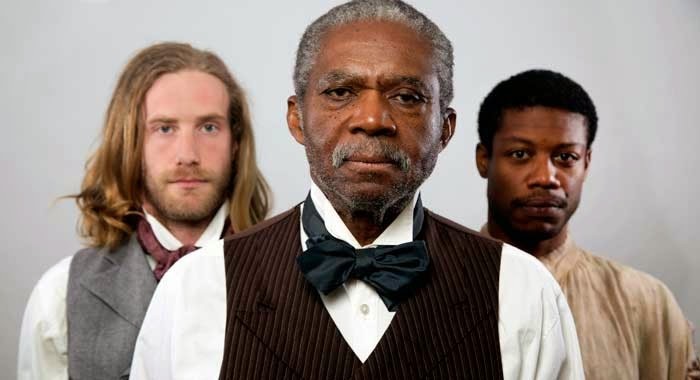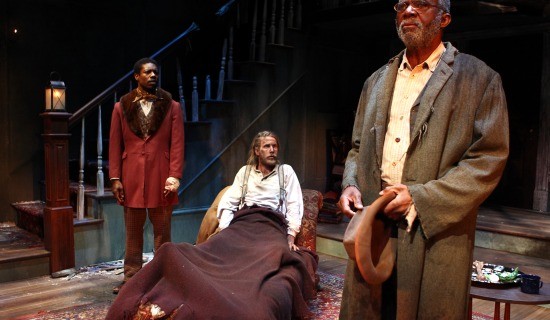
Wait a minute: there were Jews, real, live, Torah-reading Jews in the Confederate states in the Civil War, many of whom actually fought FOR the South? And some of these Jews had slaves who were raised Jewish and actually considered themselves Jews?
Matthew Lopez' play, The Whipping Man may sound like a piece of historical speculative fiction, but it's based on true accounts of people like Judah Benjamin, a prominent Louisiana lawyer who was the first Jew ever elected to the U.S. Senate and who also served as the Confederacy's secretary of state.
]
Lopez' 2006 story isn't about Benjamin, but the wreckage left behind by the sacking and immolation of Richmond, Virgina, in the final days of the Civil War. The physical wreckage is evident in Thomas Buderwitz's striking set design, the remnants of a once grand Southern manor now turned into a rotting, looted husk. But it's the psychic wreckage of the time–of newly freed slaves struggling with the concept of freedom in a nation still blown asunder by its most uncivil of civil wars, and white people struggling with both their legacy, and their future–that is most manifest.
The owner of the land is gone, as is his wife and two female black slaves, taking refuge in cities further removed from the path of ransacking Union soldiers and the equally plundering residents of Richmond.
But three men remain, or have returned home: Simon (the always fantastic Charlie Robinson), a loyal, older former slave who feels part of a family, that relatively speaking, treated its human property, usually, with something that felt like human decency; Caleb (Adam Haas Hunter, who spend so much time screaming and crying in the play that it's hard at times to get a handle for the person beneath the hysterics), a Confederate captain ailing from a gangrenous leg wound who has limped home on a dying horse from the battle of Petersburg; and John (a dynamic Jarrod M. Smith), a younger newly emancipated sort who is far less loyal, and far more seething than Simon.
What binds them is a sense of place, as well as a sense of religion. Caleb was born Jewish, even though his faith in the spiritual lies in tatters from four years in a temporal hell, and both Simon and John, though born as slaves, were taught Jewish traditions, including a smattering of Hebrew, and feel they're as much as a part of the tribe as Caleb.
Lopez' play is one of the most produced American plays of the past several years. And it's easy to see why. Though intense and starkly brutal at times, it also possesses a lyricism and a cadence to the character' speech that heightens the language, and gives these very real people a sense of loftiness. And, for a play steeped in the crucible of America's darkest chapter, and with the darkest aspect of the nation's soul, slavery, at its center, it's remarkably non-judgmental. (In fact, it is so non-judgmental that I could very well see people criticizing it for the fact these white people, aren't that bad.) While the younger John celebrates his freedom by joyfully twisting the knife in the South's defeat, it's clear that the institution he was raised in is as important to his life as his Jewish faith. It's all he knows. Caleb, the son of a prominent slave-owner, also reveals a moral complexity: though his family owns slaves, he's in love with one of them.
[

It's a riveting and compelling piece that isn't really about slavery or Judaism–though the two meet in a surprisingly surreal scene late in the play at a Seder. The end of the Civil War, April 9, happened to coincide with Passover in 1865 (president Lincoln was actually shot on the eve of the fifth day, April 14.), This gives the ad-hoc Seder organized by Charlie a multiplicity of symbols, none more heavy as when words are read by newly freed slaves about another people delivered from bondage thousands of years of before.
But though slavery and faith are obvious components in this play, it's clear in this Martin Benson-directed piece (which transfers to its co-producer, the Pasadena Playhouse, after this run concludes) that this is a play about family. And that's good, because if the focus wasn't on family, there'd be two enormous questions that Lopez never adequately addresses in his play: why captive people raped and whipped and degraded would be so thankful for being given the gift of faith by a family that owned them; and, more important, how could any moral Jew countenance owning slaves?
But those questions are tempered by the realty that this is, truly, a play about family. And, like so many families both small and extended into the world at large, this one is offered a choice in a time of crisis: to die alone or to stand together in solidarity, even in a community ravaged by the most unimaginable of horrors and with the ominous echoes of past indignities still keenly ringing in their ears.
Special kudos also to Michael Roth's original music and soundscape. As always, the guy shows what an incredible talent he is.
South Coast Repertory, 655 Town Center Dr., Costa Mesa, (714-708-5555). Tues.-Fri., 7:45 p.m.; Sat.-Sun., 2 & 7:45 p.m. Thru Jan. 25. $20-$65. Visit www.scr.org.
See also:
The 50 Best Things About the OC Music Scene
The 50 Worst Things About the OC Music Scene
The 25 Greatest OC Bands of All Time: The Complete List
Follow us on Twitter at @OCWeeklyMusic and like us on Facebook at Heard Mentality.
Joel Beers has written about theater and other stuff for this infernal rag since its very first issue in, when was that again???

